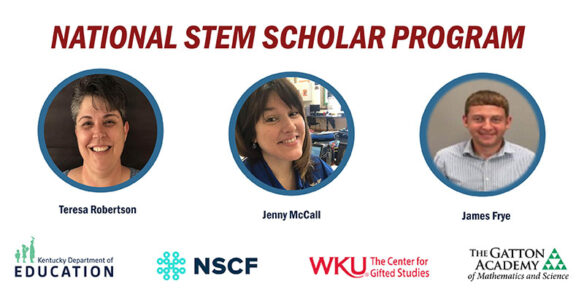
Three Kentucky teachers were selected as National STEM Scholars, a collaborative professional development opportunity for middle school science teachers.
The program was created in partnership between the National Stem Cell Foundation and Western Kentucky University’s Gatton Academy of Mathematics and Science, which selects the applicants and leads the program.
Each year, 10 National STEM Scholars are selected from across the country. The program, now in its eighth year, has recognized 80 teachers from 33 states.
All 10 teachers – including James “JJ” Frye from Grayson County Middle School, Teresa Robertson from Munfordville Elementary School (Hart County), and Jenny McCall from Winburn Middle School (Fayette County) – will attend the National STEM Scholar Program this summer. Hosted at WKU, the program will bring together the scholars to share ideas and plans for their classrooms, hear from speakers and develop a “Challenge Project” for their students.
The National STEM Scholar application required each teacher to pitch a Challenge Project that would engage students in the classroom. Teachers were selected for the program based on these projects and will receive funding to implement them via a grant from the National Stem Cell Foundation.
Each project is different and combines each teacher’s passion with students’ interests. Frye’s project involves students bringing in water samples, testing for contaminants and reporting the findings digitally to the class and beyond. He hopes this will make his students passionate about their environment and the world around them.
“They’ll see that clean water is really, really important. It’s not something to take for granted,” Frye said.
In addition to getting funding for a space-themed project for her engineering-based class, McCall expressed interest in the professional development aspect of the National STEM Scholars program.
“We come back and teach it to other teachers who didn’t get to attend the program. That’s the goal of STEM education,” she said.
All three teachers emphasized the importance of hands-on learning in their classrooms, especially in STEM subjects. For instance, Robertson’s Challenge Project has her students research, plan and lead an event on next year’s solar eclipse.
“After 19 years, I wanted to do more for my students. This world is becoming so advanced,” Robertson said. “There’s so many changes. In the past, changes happened, but now it’s like every day there’s something new. I’d rather keep up with it than be left behind.”



Leave A Comment